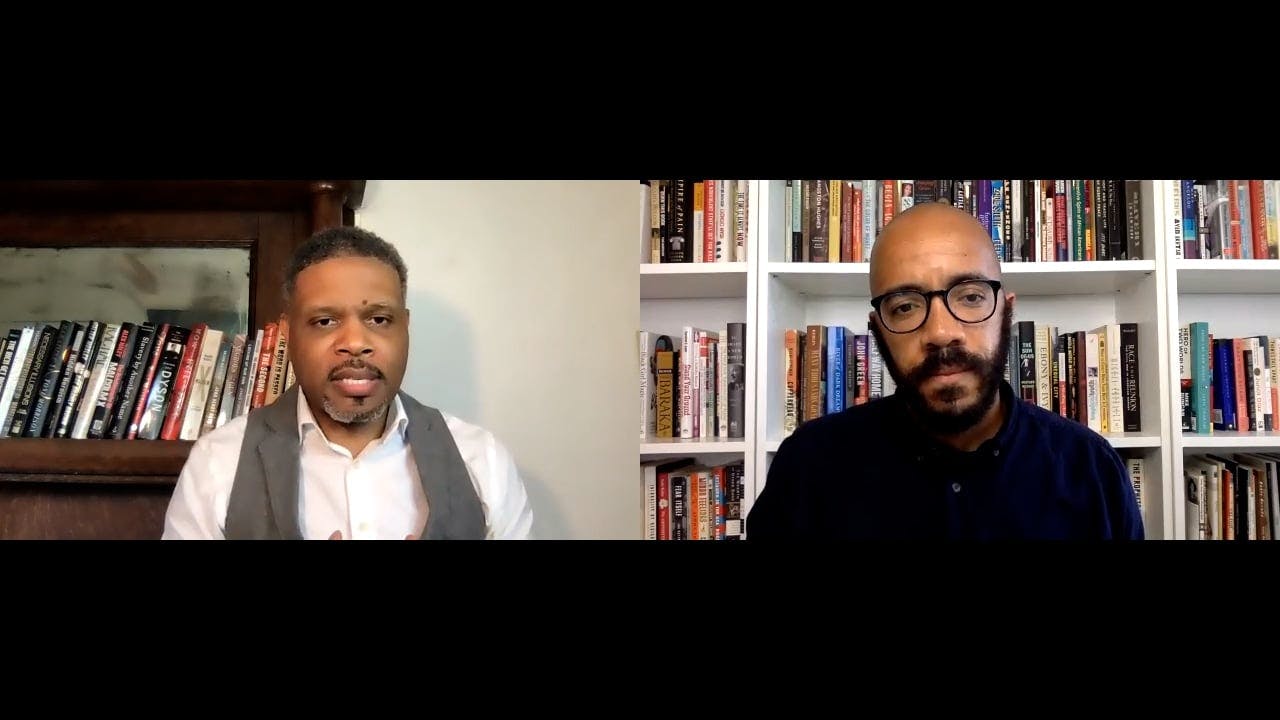
How local election officials make our democracy work
53 min watch
Four years ago, Clint Smith was wrestling with questions about how the foundations of our nation—literal and figurative—were inscribed with the telltale marks of slavery. He noticed how Americans dealt largely in distortion, omission, and even willful ignorance when it came to acknowledging the residue of the horrific 250-year institution.
Smith, who is a poet, staff writer at The Atlantic, and an Emerson Fellow at New America, began to tease out what became his #1 New York Times bestselling book, "How the Word is Passed," through a series of poems. One poem, which he adapted as a passage in the book, viscerally describes driving through his hometown of New Orleans, navigating a city adorned with the names of enslavers and emblems of the Confederacy:
“Take a left on the President of the Confederacy who made the torture of Black bodies the cornerstone of his new nation. Make the first right on the man who permitted the heads of rebelling slaves to be put on steaks and spread across the city in order to prevent the others from getting any ideas.
What name is there for this sort of violence? What do you call it when the road you walk on is named for those who imagined you under a noose? What do you call it when the roof over your head is named after people who would have wanted bricks to crush you?”
These very questions led Smith on a tour of nine key historical landmarks, seeking to understand how Americans recount and reckon with the legacy of slavery—and their proximity to it. He trains his discerning, poetic eyes on “those telling the truth, those running from it, and those doing something in between,” to grasp the extent of this reckoning.
This month, Smith joined Fellows Friday in conversation with Donnie Charleston, Director of Policy and Advocacy at E Pluribus Unum, for a wide-ranging conversation about how drawing closer to lives and truths diluted over decades can propel this national moment of racial reckoning into a just and equitable future.

FELLOWS FRIDAY SERIES: New York Times bestselling author and poet Clint Smith discusses his new book, How the Word is Passed, and sheds light on why we must understand our past in order to build a just future.
The book is about eight places, but it could have been about 100,000. There are so many places across this country in which the history of slavery is deeply embedded and scarred into the topography of this land. I wanted to create a sense of physical proximity for the reader, but also a sense of temporal proximity that I think is facilitated by that physical proximity.
I was taught about slavery in elementary school was as if it was something that happened in the Jurassic period, that it was dinosaurs, the Flintstones, and slavery, almost as if they all existed at the same time. But slavery existed for 250 years in this country and has only not existed for around 150. My grandfather's grandfather was enslaved. And so when I think about my four-year-old son and I think about him sitting on my grandfather's lap, I think too of my grandfather sitting on his grandfather's lap, and I'm reminded, again, that this history that we tell ourselves was a long time ago, truly wasn't that long ago at all.
Standing in a slave cabin at the Whitney Plantation, where actual enslaved people were held, is a reminder to me that in the scope of human history, this thing was just yesterday. And we cannot understand what our political, social, and economic infrastructure looked like if we are not going to understand how relatively recent one of the most egregious things that this country has ever done was to where we are right now.
Probably the most exemplary is the National Museum of African American History and Culture, which I think is a place that has done a really thoughtful job. It’s an excellent, excellent museum.
And then you have a place like the Whitney Plantation, which is not perfect. But it is a place that fundamentally rejects the idea that a plantation can be understood as anything other than an intergenerational site of torture and exploitation, while also saying, while we recognize this place and this system as a site of torture, part of what we also recognize is the humanity and the personhood of those who were subjected to that torture. So you hold up the horror of the institution, while also holding up the humanity of the people who had to suffer at the hands of that institution.
It is surrounded by a range of plantations where people continue to hold weddings, where they use former slave cabins as bridal suites, and celebrate one of the most joyous days of their lives in the home of someone who enslaved human beings. I think the Whitney is a really interesting case study of a place that is very intentionally moving in the opposite direction of the places that are the constellation and orbit around it.
I had a moment where I realized that I was spending all this time asking strangers about their life stories—I'm out here in these archives and primary source documents. Sometimes the best primary sources are right next to you.
I had never sat down and intentionally had a conversation about this with my grandparents, but I had been in the National Museum of African American History and Culture with them. I interviewed them a year or two years after we went to the actual museum.
When I asked my grandmother about our trip to the museum, she kept saying, "I lived it, I lived it, I lived it." She'd point to a newspaper clipping of a lynching. She's like, “I lived it.” There's a replica of a train in which Black people had to go and sit in the back. She's like, “I lived it.” This Greyhound bus in which people weren't allowed to use the bathroom in the bus station. “I lived it.”
Part of what we were talking about is how intimacy and proximity can give us a more profound understanding of the nature of a thing, the nature of what slavery was. Talking to my grandparents and realizing, “Oh, you were born in places that truly not that long ago was the Confederacy. People you knew and loved and were raised by lived in the Confederacy.” It was striking for me to recognize my own proximity to that by nature of my proximity to them.
CLINT SMITHSymbols are not just symbols, they are reflective. And names are not just names. And iconography is not just iconography. And holidays aren't just holidays.
I think there's a both/and-ness to it. It does not feel hollow, because I think to suggest that it is hollow or meaningless would do a disservice to the generations of Black people, specifically Black Texans, who fought to make this moment possible. So it is not hollow. Symbols are important.
Symbols are not just symbols, they are reflective. And names are not just names. And iconography is not just iconography. And holidays aren't just holidays. They are reflective of the stories that people tell, and those stories embed themselves into the narratives that societies carry. And those narratives shape public policy, and public policy shapes the material conditions of people's lives. And that's not to say that taking down a statue of Robert E. Lee or making Juneteenth a holiday, it's going to erase the racial wealth gap. Of course not. But it is a recognition that these things are all part of the same ecosystem of stories and ideas that shape how we collectively understand what has happened to certain communities, and what must be done for certain communities moving forward as a result of what has happened to them.
The fact that it took us 156 years to have a holiday celebrating the end of slavery is wild. Now we have it, and that is a good thing. But there's also a cognitive dissonance you experience when you have Juneteenth becoming a federal holiday, and at the same time a state-sanctioned effort across state legislatures throughout the country to prevent young people from learning the very history from which Juneteenth emerges. And so I think Black people have always lived through a marathon of cognitive dissonance in this country, in which you can hold multiple truths and realities at once.
So yes, Juneteenth becoming a federal holiday is absolutely a good thing. And it's not enough. And there's a lot more work to be done. I think that it's okay to celebrate a thing, and also to know that it in and of itself is not enough alone.